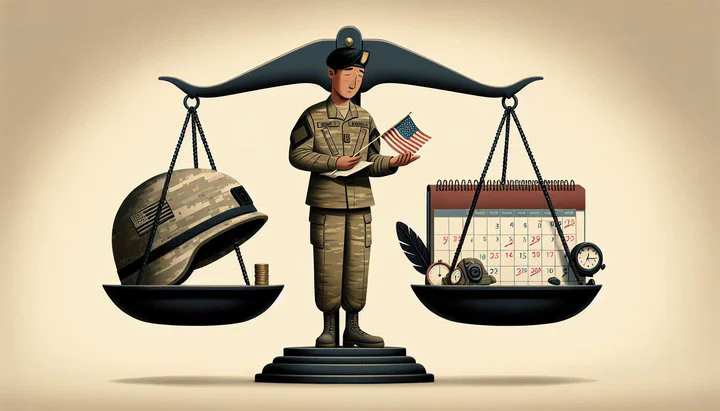Understanding Control Over LOA in National Guard

Introduction to LOA in National Guard
A leave of absence (LOA) in the National Guard is a time when you step away from your military duties. Knowing how to manage your LOA is important for balancing your personal life with your military life. You might need an LOA for many reasons, like dealing with personal health issues, helping your family, or going back to school. These are all good reasons to consider an LOA.
In the National Guard, an LOA is different from active duty. As a Guard member, you balance civilian life and military responsibilities, which makes taking a leave significant. Knowing when and how to take these breaks helps you stay on track with your service. It’s important to learn the process so you can make informed choices when life needs your attention.
Taking an LOA isn’t just about stepping away. It’s about coming back ready to fulfill your duties. The National Guard supports you by allowing time for personal matters. This flexibility is a unique part of being in the Guard. By understanding the LOA process, you can better manage your roles and responsibilities.
How to Manage Your LOA
Taking control over your LOA in the National Guard starts with knowing how to manage it well. Here’s how:
- Requesting an LOA: Start by filling out the necessary paperwork and getting approvals from your commanding officers. Clearly state your reason for leave, whether it’s for personal health, family, or education. Gather any documents needed to support your request.
- Stay Connected: Keep in touch with your unit while you’re on leave. This helps maintain your unit placement and role in the National Guard. Regular check-ins can make your return smoother. Stay updated on any changes in your unit or the military leave policy.
- Prepare for Return: Plan your reintegration before your leave ends. Catch up on training or updates you missed. Talk to your superiors about any changes to your role. If you’re involved in aviation, understanding the aviation accessions process is important for career progression.
By following these steps, you can take control of your LOA in the National Guard and return to duty with confidence.
Impact of LOA on Your Military Career
Taking a leave of absence (LOA) can affect your military career in the National Guard. It’s important to know how it might impact your duties and future opportunities.
- Unit Placement and Role: Your role might change when you return, depending on how long your leave lasts. Staying in touch with your unit keeps you informed about any changes in your unit placement and role in the National Guard.
- Career Progression: The military leave policy protects your rights during leave, but planning ahead is key. If you’re involved in the aviation accessions process, an LOA might delay your progress. Understanding these processes helps you decide when to take leave.
While an LOA might pause some career aspects, it offers time for personal growth. Whether focusing on health, family, or education, this break can benefit your career long-term. By preparing and staying informed, you ensure your time away is productive, and you return ready to advance.
Personal Stories and Advice
Hearing from others who have taken an LOA in the National Guard can provide valuable insights. Here are some stories:
- Emily’s Story: Emily took an LOA to care for a family member. She stayed in contact with her superiors, which helped her transition back smoothly. She even found new leadership opportunities upon her return. Emily’s story shows the importance of communication and preparation.
- Alex’s Story: Alex used his LOA for education. By understanding the Guard’s military leave policy, he paused his duties without impacting career progression. His story shows that personal development during an LOA can enhance future contributions.
- Jordan’s Story: As an aviator, Jordan needed an LOA for health reasons. Concerned about delays in his aviation career, he worked closely with his unit to stay updated. This allowed him to rejoin the aviation accessions process seamlessly.
These stories show that while an LOA might seem daunting, it’s a chance for growth. Learning from others offers practical advice and reassurance. You’re not alone, and shared experiences can help you take control of your LOA in the National Guard.
Resources and Support for Guard Members
When considering an LOA in the National Guard, it’s important to know where to find support.
-
Official Resources: Your unit’s human resources or personnel office can guide you through paperwork and explain the military leave policy. They can help you understand how leave affects your unit placement and role.
-
Online Communities: Subreddits like r/NationalGuard and other military forums offer spaces to connect with fellow Guard members and share experiences. These platforms provide practical tips and emotional support.
-
Specialized Support: For specific concerns like the aviation accessions process, reach out to mentors or colleagues for guidance on managing your career while on leave. Organizations like Military OneSource offer resources tailored to military families and veterans.
Remember, you’re not alone in navigating your LOA. By using these resources, you can manage your leave and transition back smoothly. Whether seeking advice or support, there’s a community ready to help you maintain control over your LOA in the National Guard.
Conclusion
Taking a leave of absence in the National Guard is a significant step, but with the right approach, it can be managed effectively. By understanding the process, staying connected, and using available resources, you can ensure a productive leave and a smooth return. Remember, you’re not alone in this journey—support is available, and taking control of your LOA can lead to personal and professional growth. Use the guidance and stories shared here to navigate your LOA confidently and continue contributing to your unit and your career.